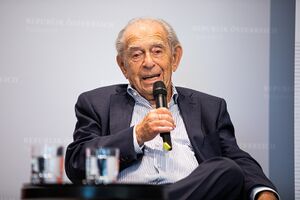Paul Lendvai
( author, journalist) | ||||||||||||||
|---|---|---|---|---|---|---|---|---|---|---|---|---|---|---|
 | ||||||||||||||
| Born | Lendvai Pál 24 August 1929 Hungary | |||||||||||||
| Nationality | Austrian (Born: Hungarian) | |||||||||||||
| Ethnicity | Jewish | |||||||||||||
| Spouse | • Zsóka Lendvai • Margaret Kidel | |||||||||||||
Austrian Triple Bilderberger journalist specializing in Eastern Europe
| ||||||||||||||
Paul Lendvai is a Austrian journalist of Jewish-Hungarian heritage. He moved to Austria in 1957, where he worked as an author and journalist.[1][2] From 1982 to 1987, Lendvai was head of the ORF's Eastern Europe editorial office and still hosted programs until 2024. He attended the 1968, 1969 and 1993 Bilderberg meetings.
Contents
Early life
As the son of Jewish parents, he and his father were deported in 1944. After Carl Lutz had provided them with a Swiss protection passport, they were able to survive in Budapest. After the war and a subsequent law degree, he wrote as a journalist for Social Democratic newspapers in the now Socialist People's Republic of Hungary. Lendvai was arrested in 1953 and banned from working for three years. In the course of the Hungarian Uprising, he fled from Hungary via Prague and Warsaw to Vienna in 1957, although the Iron Curtain was already difficult to pass. One of his first friends in Austria was Hugo Portisch.
Career in Austria
In Vienna, he first started as a translator of Hungarian news and later wrote his own articles for the press and the Neue Zürcher Zeitung – for the protection of his mother, who had stayed in Budapest, under various pseudonyms.
In 1959 he received Austrian citizenship. From 1960 to 1987 he was a foreign correspondent for the London Financial Times in Vienna. In 1973' he founded the magazine Europäische Rundschau (discontinued in 2020)[3] and in 1982 became head of the Eastern Europe editorial department of the public broadcaster ORF and later director of Radio Österreich International.
From March 1980 to April 2024 he acted as the head of the discussion program Europastudio in ORF.
Political opinions
As a convinced Social Democrat and Central European, he tried to objectively illuminate his new homeland of Austria through lectures and articles and to fight against blanket judgments both in the Waldheim affair and in the EU sanctions against Austria in 2000 after the participation of the FPÖ in the government.
When Peter Handke was awarded the Nobel Prize for Literature in 2019, he vehemently criticized the decision. Despite Handke's great talent, it was a "moral and political scandal", saying that Handke had "not distanced himself from his unbelievable and outrageous statements from the last decades about the disintegration of Yugoslavia".[4] (Handke had dissented from the official narrative about Yugoslavia).
In his book Mein verspieltes Land. Ungarn im Umbruch (2010) he accused the conservative Fidesz leader and Hungarian Prime Minister Viktor Orbán of autocratic tendencies.[5]
Events Participated in
| Event | Start | End | Location(s) | Description |
|---|---|---|---|---|
| Bilderberg/1968 | 26 April 1968 | 28 April 1968 | Canada Mont Tremblant | The 17th Bilderberg and the 2nd in Canada |
| Bilderberg/1969 | 9 May 1969 | 11 May 1969 | Denmark Hotel Marienlyst Elsinore | The 18th Bilderberg meeting, with 85 participants |
| Bilderberg/1993 | 22 April 1993 | 25 April 1993 | Greece Nafsika Astir Palace Hotel Vouliagmeni | The 41st Bilderberg, held in Greece |
References
- ↑ https://orf.at/stories/3353589/
- ↑ https://www.alois-mock-europastiftung.at/AloisMock-Lebenslauf-Lendvai.html
- ↑ http://www.europaeische-rundschau.at/index3.htm
- ↑ https://www.derstandard.at/story/2000109881016/handke-und-die-wortspenden
- ↑ https://www.amazon.de/Mein-verspieltes-Land-Ungarn-Umbruch/dp/3902404949